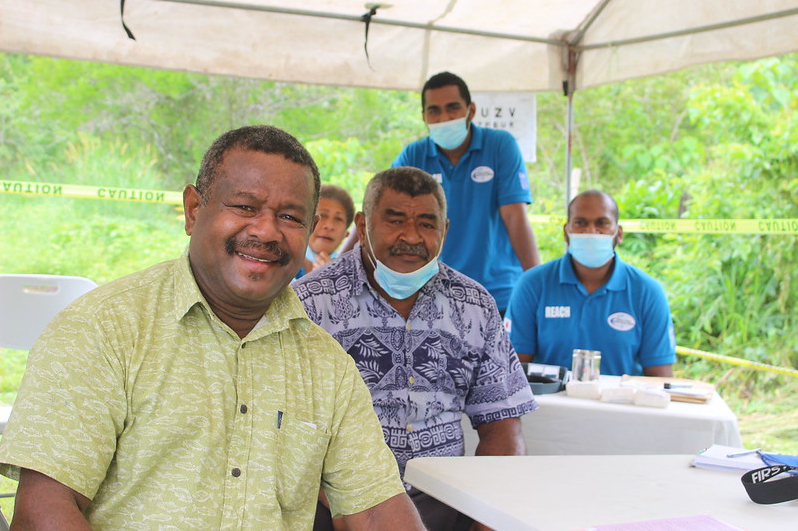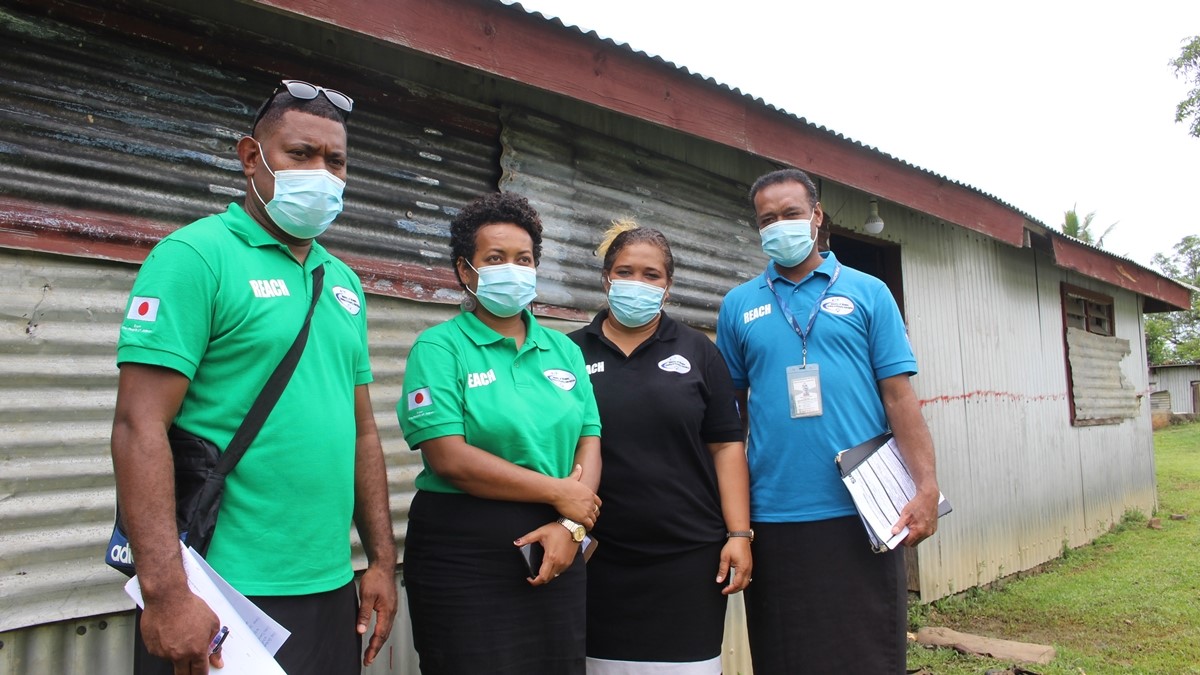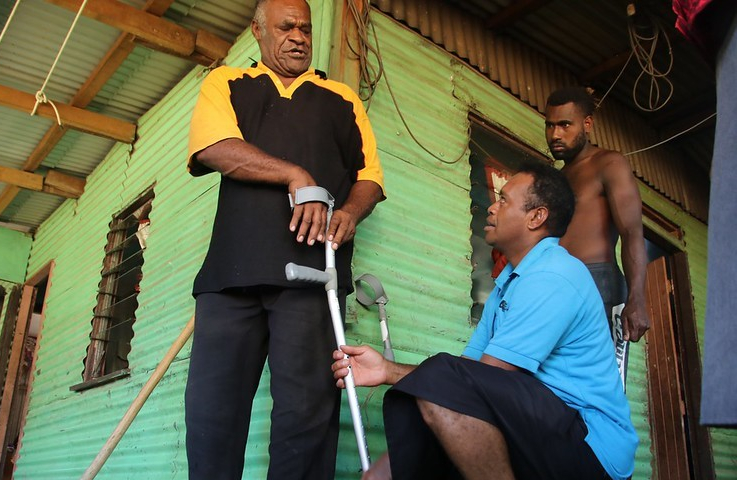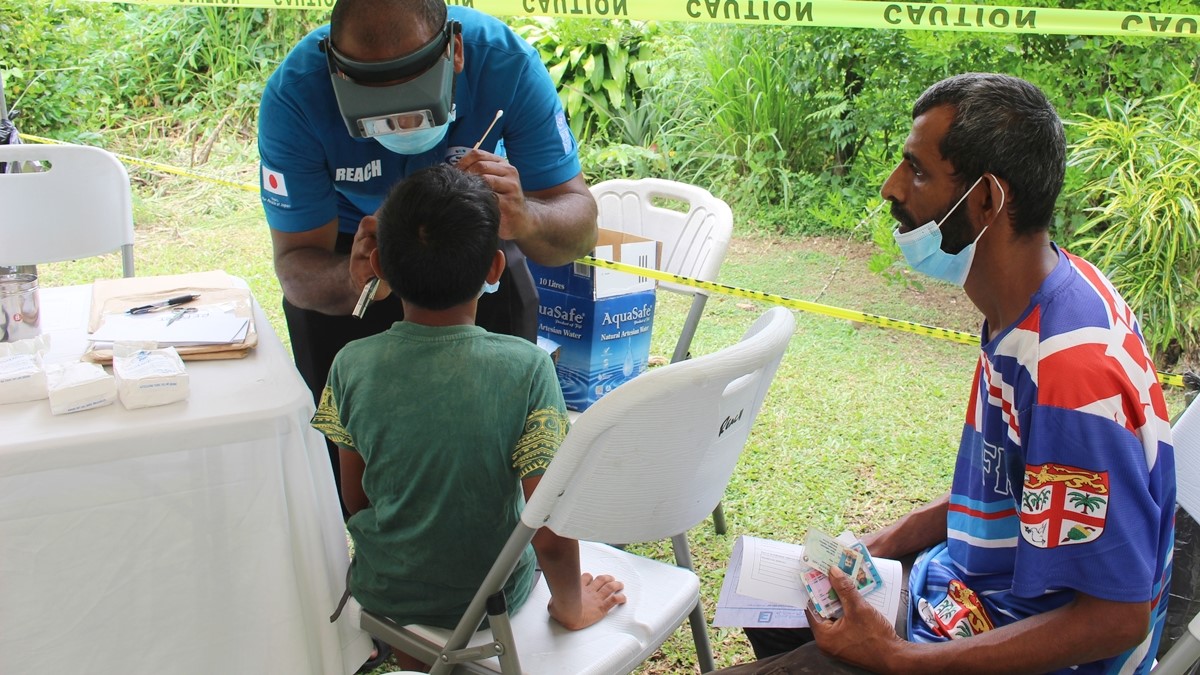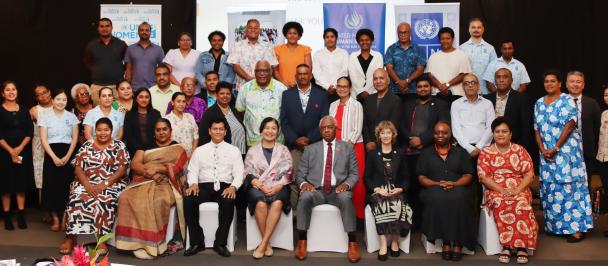Community members received customized support from the Project HEAVEN (Aminiasi Navukura, center) (Photo: UNDP)
Aminiasi Navukura is a happy man, thanks to a community visit to his village recently.
He almost lost his eyesight after noticing that the condition of his right eye was deteriorating but he was fortunate to get first-hand advice from a visiting team from government agencies and civil society organizations (CSOs). The Rights, Empowerment and Cohesion (Reach) for Rural and Urban Fijians team visited the Nadroga/Navosa Province in Viti Levu and provided various public services as a one-stop shop to people in various locations. In these areas, people often face difficulties to access necessary social, legal, special medical services due to the geographical locations of the communities, financial or physical constraint, and often lack of awareness on their right to access services.
During the visit, the 58-year-old from Coko village, in the Nadroga/Navosa Province managed to get an eye-check and was advised that his eye could be treated. Navukura received a letter certifying his medical condition from Project HEAVEN, a CSO which provides hearing and vision screening and assessment. With the supporting letter, he was encouraged to see the eye surgeon who will be visiting Fiji from Sri Lanka to treat Fijians with eye conditions over the coming weeks. Navukura was one of the villagers who was lucky to have received the services of information sharing and consultation that Fijians are entitled to. He would not have been able to access these services had it not been from the Government and CSO service delivery platform.
At the town centre service delivery station set up by the REACH project for the day, Navukura with a smile on his face, was chatting with his fellow community member who has received a prescription for ordering his first ever glasses from Project HEAVEN.
“I received medical advice for my eye for the first time ever since I had problems on my right eye. I am looking forward to seeing the visiting surgeon soon. I appreciate the arrangements made to come all the way to our communities and provide these services,” said Navukura.
The community-based, mobile and integrated approach has been applied to public service delivery, as a most suitable method to reach out to vulnerable communities in Fiji, coordinated through the REACH project. The initiative is led by the Ministry of Women, Children and Poverty Alleviation (MWCPA) in partnership with the UN Development Programme (UNDP) and with financial support from the Government of Japan. The REACH project has been revamped with additional financial support from Japan to address inter-connected issues people are facing as the negative impact of the COVID-19 pandemic in the recovery path.
While the team members were providing services to people gathered at the Government center of Vatumali, Keyasi, a small town in the interior of Fiji’s main island of Viti Levu, a few officers took an extra mile to provide support to a family in need. The team had identified various support services to the parents looking after their 26-year-old daughter, Milika (not her real name) who has not been able to move by herself due to her severe spinal conditions.
The purpose of this visit to the family was to assess her medical needs and to measure her mobility aid equipment, which needs to be specially designed to assist her comfortable movement.
The team of government and CSO specialists provides support to Milika and her family (Photo: UNDP)
On top of the social welfare financial support provided to the family, they also provided an initial counselling and awareness raising of the parents about their duties and rights, and the needs of specialized care for their daughter to enable her to live with dignity. Then, the parents would be able to communicate with their daughter and find out what she wishes to do and how, and slowly expand her autonomy and strengthen her ownership of herself.
Sebasitiano Nauluvula, the disability officer at the Dept of Social Welfare Office based in Sigatoka, who has been assisting the family said, “It may take time but we are determined to go through with the family to empower the young woman to do what she wishes. For that purpose, the integrated and coordinated service provision is important. The REACH project enabled us to coordinate different sectors and provide various support to address the complex needs of the family.”
International Day of Persons with Disabilities, 3 December, this year seeks ‘Leadership and participation of persons with disabilities toward an inclusive, accessible, and sustainable post-COVID-19 world’. The first step has been taken by Milika herself, her parents, and support team to enable and empower her to participate in her social life. The celebration of the rights of persons with disabilities was organized in her community by the team commemorating the Day.
“We would have had to take longer time to reach the family and would have faced more challenges to provide necessary services to them without the REACH platform,” Eloni Qaqa from a CSO, Spinal Injury Association said.
Eloni Qaqa from the Spinal Injury Association providing mobility aid support to Atunaisa Matakula at Semo Village, Nadroga. (Photo: Joeli Uluinayau)
The REACH integrated service delivery platform with COVID-19 safe protocol is being implemented further in Fiji and Tonga next year, in partnership with both governments. The platform will give priority to the specific needs of the most vulnerable groups to the social and economic impacts of the COVID-19 pandemic enabling them to get back on track in the recovery process. The initiative also aims to provide support aftermaths of potential cyclones and adverse weather events in both countries.
A child being treated by the Project HEAVEN (Photo: UNDP)
The REACH platform model aims to progress the achievement of the Sustainable Development Goals (SDGs), despite the impact of COVID-19 and Cyclones, in partnership with government agencies, CSOs and communities.
For media queries, please contact:
Tomoko Kashiwazaki, UNDP Pacific Office in Fiji; email: tomoko.kashiwazaki@undp.org

 Locations
Locations